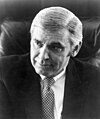Jonestown conspiracy theories

The 1978 Jonestown massacre has prompted conspiracy theories claiming that the deaths were the result of mind control experiments or assassinations by the Central Intelligence Agency.
CIA conspiracy theories
According to Religious Studies scholar Rebecca Moore, "In the twenty-three years since the deaths in Jonestown, conspiracy theories have blossomed in number and sophistication."[1]
Joseph Hollinger, a former aide to Congressman Leo Ryan who was killed at Jonestown, claimed that Jonestown was a "mass mind control experiment" conducted by the CIA. Columnist Jack Anderson also claimed that the CIA was involved in the Jonestown Massacre and speculated that Deputy Chief of Mission of the U.S. Embassy to Guyana Richard Dwyer had ties to the CIA.[2] In 1980, the U.S. House permanent select committee on intelligence found no evidence of CIA activity in Jonestown.[3]
In 1987, The Jonestown Carnage: A CIA Crime (1978) (Russian: Гибель Джонстауна - преступление ЦРУ) was published in the Soviet Union, claiming that group members were assassinated by CIA agents and mercenaries to prevent further political emigration from the U.S. as well as suppress opposition to the U.S. regime.[4] Political scientist Janos Radvanyi cites the book as an example of Soviet active measures during the 1980s that "spread both disinformation stories and enemy propaganda against the United States", adding, "It's hard to imagine that anyone could believe so ridiculous a story".[5]
References
- ^ "Reconstructing Reality: Conspiracy Theories About Jonestown". Jonestown.sdsu.edu. Retrieved 2016-03-12.
- ^ Anderson, Jack, "CIA Involved In Jonestown Massacre, September 27, 1980
- ^ Peter Knight (2003). Conspiracy Theories in American History: An Encyclopedia. ABC-CLIO. pp. 379–. ISBN 978-1-57607-812-9.
- ^ "Джонстаун-1: bey". Bey.livejournal.com. Archived from the original on 2016-06-14. Retrieved 2016-03-12.
- ^ Janos Radvanyi (1990). Psychological Operations and Political Warfare in Long-term Strategic Planning. ABC-CLIO. pp. 53–. ISBN 978-0-275-93623-5.
Bibliography
- Renardo Barden (1990). Cults (Troubled Society series). Rourke Pub Group. ISBN 0-86593-070-8.
- Sean Dolan (2000). Everything you need to know about cults. New York: Rosen Pub. Group. ISBN 0-8239-3230-3.
- Jack Sargeant (2002). Death Cults: Murder, Mayhem and Mind Control (True Crime Series). Virgin Publishing. ISBN 0-7535-0644-0.
- Jonestown Carnage: A CIA Crime - S.F. Alinin, B.G.Antonov, A.N.Itsko (Gives USSR version of the Jonestown massacre, argues that it was a crime committed by CIA.)
- Rebecca Moore (1985). A sympathetic history of Jonestown: the Moore family involvement in Peoples Temple. Lewiston: E. Mellen Press. ISBN 0-88946-860-5.
- Charles A. Krause; with exclusive material by Laurence M. Stern, Richard Harwood and the staff of The Washington Post; with 16 pages of on-the-scene photos. and commentary by Frank Johnston (1978). Guyana massacre: the eyewitness account. [New York]: Berkley Pub. Corp. ISBN 0-425-04234-0.
{{cite book}}: CS1 maint: multiple names: authors list (link) CS1 maint: numeric names: authors list (link) - Shiva Naipaul (1982). Journey to nowhere: a New World tragedy. Harmondsworth [Eng.]: Penguin. ISBN 0-14-006189-4. (published in the UK as Black and White) Shiva Naipaul
- Phil Kerns (1978). People's Temple, People's Tomb. Logos Associates. ISBN 0-88270-363-3.
- Raven: The Untold Story of The Rev. Jim Jones and His People by Tim Reiterman with John Jacobs
- Marshall Kilduff; Ron Javers (1978). The suicide cult: the inside story of the Peoples Temple sect and the massacre in Guyana. New York: Bantam Books. ISBN 0-553-12920-1.
- Jonestown: The Life and Death of Peoples Temple a film by Stanley Nelson
- Snake Dance: Unravelling the Mysteries of Jonestown by Laurie Efrein Kahalas, Trafford Publ 1998. ISBN 978-1-55212-207-5. Controversial 'insider' material.
- Michael Meiers (1989). Was Jonestown a CIA Medical Experiment?: A Review of the Evidence. Edwin Mellen Pr. ISBN 978-0889460133.
External links
This article's use of external links may not follow Wikipedia's policies or guidelines. (May 2015) |

